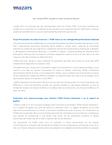
IFRS: ongoing projects and future actions
IFRS: ongoing projects and future actions
Presentation of financial statements: the IASB rules on management performance measures
Following the initial re-deliberations on this project in March 2021, the International Accounting Standards Board (IASB) has, as planned, re-discussed the possible extension of the scope of its performance measures requirements chosen by management (“Management Performance Measures” or MPM). The draft presentation of December 2019 provided the provision of mandatory minimum information in this regard, in a single note in the annexes to the financial statements.
In March, the IASB decided to explore other possible approaches to broaden the scope of the MPMs initially envisaged in the standard draft.
Mainly, in order not to subject a new draft to debate, which would have had the effect of significantly delaying the progress of the project, the IASB finally decided to stick to the initial proposals for the time being. However, the IASB has taken steps to include in its scope of the MPM requirements the numerator or denominator of a report, if that numerator or denominator meets the definition of an MPM.
The IASB also decided, on a provisional basis, not to extend the scope of MPMs to the following items: valuations based on items presented in the profit and loss account, valuations based on cash flow statements, balance sheet valuations, percentages.
Publication of an exposure draft to reform IFRS Practice Statement 1 on the management report
On May 27, the IASB published an exposure draft aiming to thoroughly overhaul the IFRS Practice Statement 1 on the management report which was published in December 2010. Today, the management report is essentially seen as a document supplementing the financial statements. The IASB's proposals aim to present in a single document the information that is useful for investors to assess the long-term prospects of an entity, in order to understand how the entity's business model creates value and generates cash flow.
The IASB's proposals thus seek, in particular, to better communicate the environmental and social impacts of an entity's activities and on intangibles that are not recognized in the balance sheet. This amended Practice Statement would remain non-mandatory and would therefore continue to provide a framework for the publication of the management report to which stakeholders could refer if they so wish.
The call for comments is open until November 23, 2021.
Draft amendment limited to IFRS 17 « classification overlay »
After some initial discussions in May, the IASB decided this June to propose a limited amendment to IFRS 17 in order to facilitate the transition of insurers to this new standard, as well as to IFRS 9. In this case, the transitional provisions for the first application of IFRS 9 make the presentation of comparative periods according to this standard optional.
If an entity decides to apply IFRS 9 to comparative figures, however, it can only do so for financial instruments that still exist at the date of transition. In other words, the financial assets sold or expired before the transition remain accounted for under IAS 39, while those that still exist upon the transition date are restated per IFRS 9.
The solution proposed by the IASB (provisional at this stage) would be to create within IFRS 17 a “classification overlay” option during the transition to IFRS 17, allowing each financial instrument, which is represented by technical insurance liabilities, within the comparative financial statements, to apply the IFRS 9 classification that it would have had if the standard had been applied to it from the beginning (even if some of these financial instruments no longer exist at the transition date).
The proposed amendment is expected to be published as early as July with a consultation period shortened to two months. This accelerated process will allow insurers to benefit from it for the preparation of the comparative period 2022, therefore in time for the first application of IFRS 17 (and IFRS 9) on January 1, 2023.
IFRS IC decision on going concern (IAS 10)
The IFRS IC published in June 2021 a final decision answering two questions relating to the going concern: an entity that is no longer in a position to continue its business in year N:
- may, despite everything, prepare financial statements for previous periods by applying the going concern principle (perspective in which the entity was during these periods) also when it had not previously prepared financial statements for these periods?; and
- must restate previously published comparative information (assuming ongoing concern) in order to take this new assumption into account?
To find the answers to these questions and for more information related to IFRS news, check out our IFRS Accounting Newsletters available online!
For the French version of the article, access the document below.


